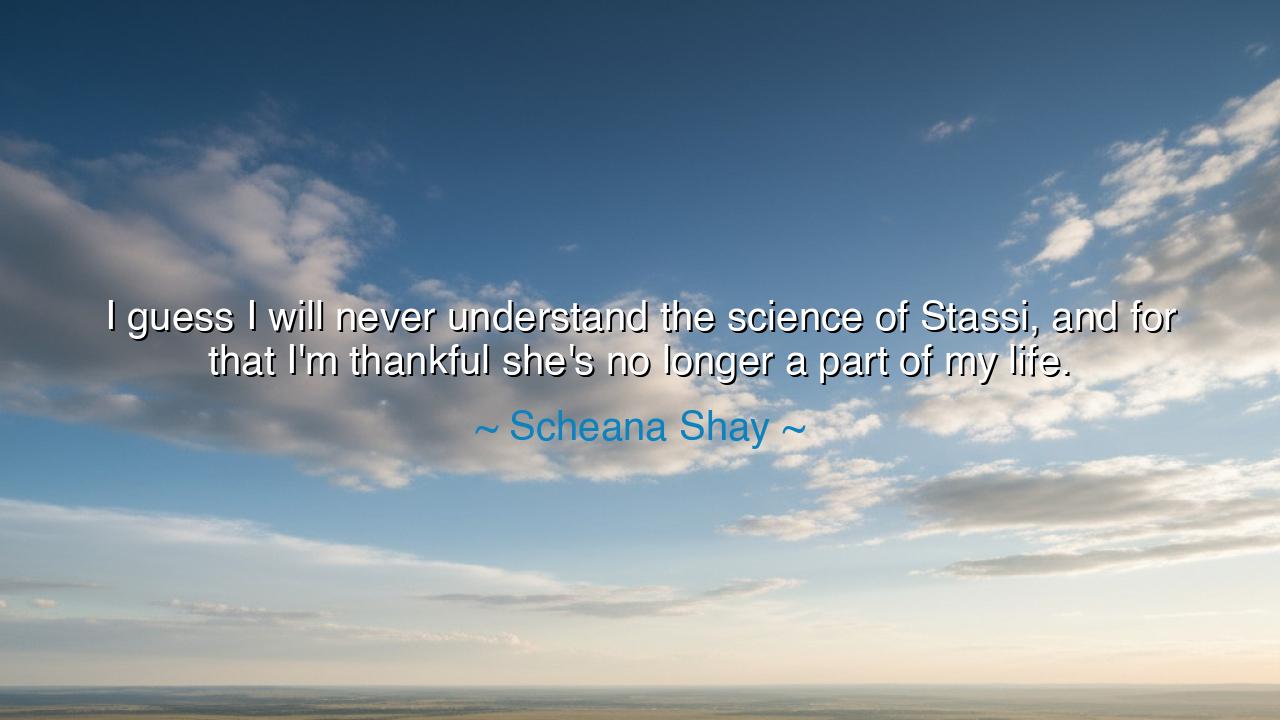
I guess I will never understand the science of Stassi, and for
I guess I will never understand the science of Stassi, and for that I'm thankful she's no longer a part of my life.






Scheana Shay, in her moment of reflection, spoke these piercing words: “I guess I will never understand the science of Stassi, and for that I’m thankful she’s no longer a part of my life.” Though born in the fires of personal conflict, her words rise to a truth that has echoed through the ages — not all relationships are meant to be understood, and not all bonds are meant to endure. Some souls enter our lives like storms, stirring chaos, leaving confusion in their wake. To cling to them is to drown; to release them is to find peace.
The origin of this saying lies in the tangled relationships of reality, in the friendships and rivalries made visible on the stage of entertainment. Yet behind the glitter of television, Scheana spoke to something deeply human: the weariness of trying to comprehend someone who brings more strife than solace. By calling it the “science” of another, she confessed that some people are as mysterious and impenetrable as the cosmos, their ways beyond logic, their motives too clouded to be unraveled.
History offers us countless mirrors of this truth. Consider the story of Cato the Younger and Julius Caesar. Both were Romans of great talent, yet utterly opposed in spirit. Cato could never understand Caesar’s hunger for power, and Caesar could not accept Cato’s relentless virtue. Their relationship was not one of harmony but of constant strife. And when the clash became unbearable, they parted ways — not in friendship but in enmity. The world itself was shaped by their inability to find peace together. So too in personal life, there are bonds that cannot be reconciled, and wisdom lies not in endless striving, but in release.
Scheana’s words remind us that freedom often begins when we stop demanding understanding from those who bring turmoil. Not every person will explain themselves. Not every heart can be translated into ours. Sometimes the greatest act of love for ourselves is to let go, to say, “I do not need to understand, I only need to move forward.” Gratitude, then, becomes a weapon against bitterness, turning loss into liberation.
To the weary soul who struggles with broken friendship, know this: you are not called to solve the unsolvable. There will be those in your life whose actions seem like riddles, whose motives twist like shadows. Do not waste the fire of your spirit on endless analysis. Instead, accept the mystery and choose peace. Say to yourself, as Scheana did, that it is enough to be free from the burden of that storm.
To those who remain, the lesson is equally profound: be mindful of the energy you bring into the lives of others. If your presence is a constant trial, if your ways leave others bewildered and wounded, reflect and mend. For relationships are the mirror of our souls, and what we sow in them returns to us. Strive, therefore, to be the presence that gives rest, not the storm that drives others to relief at your absence.
The eternal wisdom in Scheana’s words is this: not all bonds are meant for permanence. Some are lessons, some are trials, and some are stepping stones to a freer self. We must not cling to every tie as if it were sacred, for in doing so, we may strangle the life within us. Instead, walk boldly, let go when the weight becomes too heavy, and give thanks for the freedom found in release.
Thus the teaching stands: when a person departs from your life, and with them goes confusion and strife, do not grieve endlessly. Instead, be grateful, for you have gained clarity. And in that clarity lies the path to growth, to peace, and to the embrace of relationships that nourish rather than drain the soul.






AAdministratorAdministrator
Welcome, honored guests. Please leave a comment, we will respond soon